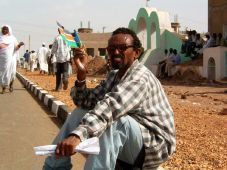Sudan’s SPLM moves north
Feb 16, 2007 (KHARTOUM) — Sudan’s southern former rebels said on Friday they would move their headquarters to Khartoum to influence national policy more as north-south relations had soured since a 2005 peace deal ended Africa’s longest civil war.
 Under the peace accords a national coalition government was formed, wealth and power was shared and the south given the right to vote on secession by 2011.
Under the peace accords a national coalition government was formed, wealth and power was shared and the south given the right to vote on secession by 2011.
But the Sudan People’s Liberation Movement (SPLM) has complained their northern partners in peace, the dominant National Congress Party (NCP), have not implemented the accord and have taken key policy decisions unilaterally.
“We are going to relocate the headquarters of the SPLM to Khartoum so as to be more active in national politics,” said SPLM spokesman Yasir Arman.
The SPLM headquarters was previously in the south Sudan capital Juba and observers had often criticised the SPLM for focusing on southern issues and neglecting national politics.
Arman said the NCP was wrong to prevent a U.N. human rights delegation from visiting the war-torn west Sudan region of Darfur this week and it was just the latest in a string of decisions imposed by the NCP without consulting the SPLM.
“This will add more fuel to the problems between the government of Sudan and the international community and we don’t want to do that,” said Arman.
COALITION IN DANGER
Khartoum has defied a U.N. Security Council resolution authorising some 22,500 U.N. police and troops to keep peace in Darfur, calling it an attempt to colonise Sudan. The SPLM supports a clearly mandated U.N. Darfur mission.
Relations have been tense between the world body and the NCP, which expelled Jan Pronk, the top U.N. official in Sudan, last year. This week Khartoum also refused visas to a six-member delegation from the Geneva-based U.N. human rights council, saying one member was biased.
Arman criticised also this decision.
“We need the cooperation of the international community to reach a peaceful political solution to the Darfur problem which is more important than the fuss about visas,” he added.
He said the NCP was using its mechanical majority rather than taking decisions by consensus within the coalition government formed by the January 2005 peace deal, he said.
Under the deal the NCP was allocated 52 percent of parliament and government institutions while the SPLM took 28 percent with the rest going to other political forces.
But another SPLM official who declined to be named said a “gentleman’s agreement” was made at negotiations that decisions would be taken by consensus. “But we made a pact with the devil,” he told Reuters from Juba.
Arman said if the NCP persisted in pushing through its policies without consensus the coalition could be in danger.
“This will no longer be a government of national unity but a government of the National Congress Party,” he said.
(Reuters)
